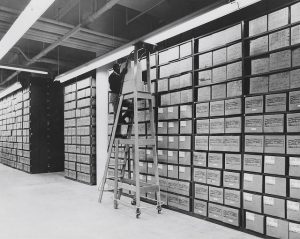I earned my undergraduate degrees in history and business, and while my primary interest was in history, by graduation I had burned out on academia. Looking for a change of pace, I took a job at a healthcare IT organization. As I gained more work experience, I noticed I drew on the skills I learned as a history major more frequently than the skills from my business major. I began to see how well thinking like a historian applied to my roles as a project manager and a business analyst.

Conducting historical research taught Stephanie Fulbright the skills to analyze varied sources and produce comprehensible results. US National Archives
The terms project manager and business analyst can be used to describe a number of different jobs. In my organization, project managers are responsible for determining the steps necessary to complete a project, which is a defined set of work with a beginning and end date. Project managers work with the project team to craft a plan for getting the project done and then help ensure the work gets completed. They do not, however, directly manage any of the team members. Business analysts get involved at the start of projects and help the people requesting them articulate what they are trying to achieve and how they will know they successfully met their goals. For example, I am currently working on a project to determine if a new perinatal alerting system (for monitoring babies’ heart rates during birth) improves clinical outcomes for moms and their babies. To see if the system is in fact impacting outcomes, we need to figure out what data points are available and how to measure them in way that gives us an answer to our questions.
Project managers and historians share some similar ways of thinking. First, both try to construct a logical flow of steps or events. Historians usually know something about the ending (present day, for example) and maybe something about the beginning. Historical research is often centered on figuring out what happened in the middle and how people got from there (past) to here (present). Similarly, project managers know what the end should be and need to figure out all of the steps to get from here (current state) to there (future state). To do that, project managers have to organize lots of information from lots of different sources. Each part of the project team has ideas about what needs to be done, and the project manager needs to synthesize those ideas into a coherent plan for the team to follow. For me, writing historical research papers taught me how to bring together different, and sometimes contradictory, sources into something other people could understand and follow. My training as a historian taught me how to comprehend big complex pictures and to communicate that understanding to others.
I currently work as a business analyst, and like in my project management role, I have found I am thinking like a historian. For instance, I often find myself in meetings where multiple stakeholders are using the same words but it is clear they mean different things. Part of my job is to notice those discrepancies and help clarify what is being said. This awareness of nuances in language is something historians learn to identify, as they balance the tension between continuity and changes from the past. In a sense, historians are translators; they help people understand the past on its own terms. As a business analyst I do a similar type of translating. Additionally, as a business analyst I have the opportunity to think broadly about solutions and their impacts. As historians, we also learn to think about a wide range of factors that can influence and/or extend from historical events. My historical imagination helps me envision the effects of solutions or technologies.
Both project management and business analysis require persistent research and strong writing and communication skills. Historical training gave me both. My history degree taught me how to dig for information, especially when it is hard to find. It taught me to write for multiple audiences and convey complex ideas logically and clearly. Perhaps most importantly, my history degree taught me how to ask deep, probing questions. It taught me to get below the surface of things by being curious. The ability to formulate good questions has been the most helpful skill in advancing in my career.
Historical thinking can be applied to any number of industries and roles. From my experience, I think it translates particularly well to project management and business analysis. Although I do have a business degree as well, it is actually my history degree that I find continually relevant to my work. Proficiency in understanding complexity, communicating effectively, doing thorough research, thinking broadly, and asking good questions has opened the doors to a successful career. History degrees are immensely practical and they can teach you things that will set you apart from your peers if you do decide to go into the business world.
This post is published under a Creative Commons Attribution 2.0 Generic license.
This post first appeared on AHA Today.
Stephanie Fulbright works as a business analyst for a healthcare company in Nashville, Tennessee. She obtained her BS from Belmont University in history and in organizational effectiveness, and an MTS from Vanderbilt Divinity School in public history of religion. Stephanie is passionate about promoting the role historical thinking can have outside of the discipline.
Tags: AHA Today What to Do with a BA in History
Comment
Please read our commenting and letters policy before submitting.






